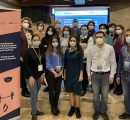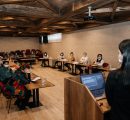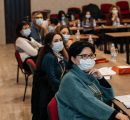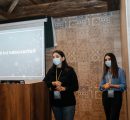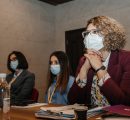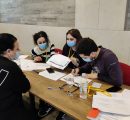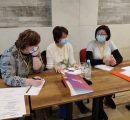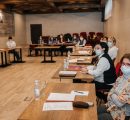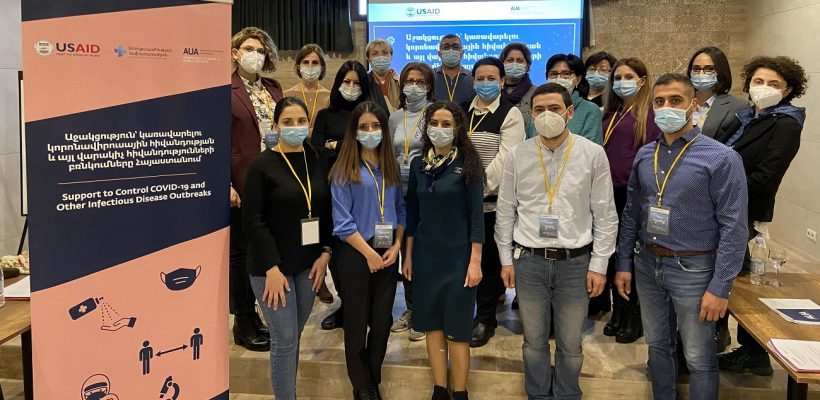
Stakeholders’ Meeting on Laboratory System Capacity Strengthening in Armenia
3 min readYEREVAN, Armenia — The American University of Armenia (AUA) Fund, in collaboration with the Ministry of Health of the Republic of Armenia, is implementing the United States Agency for International Development (USAID)-funded project, Support to Control COVID-19 and Other Infectious Disease Outbreaks. The project is working to strengthen Armenia’s national capacity to control COVID-19 and other communicable disease outbreaks and emergencies of potential public health concern. The work undertaken through this project is aligned with and directly contributes to advancing the government’s Public Health Emergency Preparedness and Response Strategy.
The Avedisian Onanian Center for Health Services Research and Development (CHSR) at AUA led a two-day stakeholder meeting in late November which convened professionals from various laboratory services in Armenia, including representatives from public and private labs functioning throughout the country and involved in COVID-19 PCR testing, as well as policy and decision makers directly associated with issues of laboratory functioning. During the meeting, CHSR shared the findings from the laboratory network assessment conducted under this USAID project; participants then developed recommendations aimed at strengthening the capacity of lab systems in Armenia.
Zaruhi Grigoryan, research associate at the CHSR and the leading researcher of the study, emphasized, “This workshop was important in terms of the opportunity to present the study findings to stakeholders and hear their feedback. The meeting served as a unique platform for stakeholders to express their valuable insights and suggestions for improving the laboratory capacity in Armenia.”
The meeting discussions were co-led by laboratory expert Dr. Eduard Kabasakalyan, head of the National Reference Laboratory of the National Center of Pulmonology. “This research is a completely new effort in the field of medical laboratories in Armenia: it reveals different perspectives on the existing gaps and strengths of the laboratory system,” said Dr. Kabasakalyan. “The recommendations [discussed] can serve as a foundation for strengthening the laboratory services in general, establishing a national laboratory network, addressing a number of issues related to COVID-19 pandemic, while contributing to sustainable development and preparedness for future similar outbreaks.”
The lab assessment results reveal the existing weaknesses in the laboratory network, including public and private laboratories in Armenia. The identified challenges demonstrate that, at the beginning of the pandemic, there were shortages of human and technical resources, as well as deficiencies in biosafety-related issues; many of the issues identified were resolved over time but would need longer-term solutions for sustainability. Among the most important findings is the lack of a systematic approach to quality control and improvement. Supervision of the laboratory system is limited to checking compliance with licensing requirements. Laboratory system regulations in Armenia lack the necessary mechanisms for mandatory accreditation and quality control. For example, there is no process in place for controlling the activities of laboratories offering SARS-COV-2 PCR testing.
Biosafety is another major challenge. There is no dedicated unit dealing with biosafety in the laboratory system of Armenia. Waste management, for example, is guided through the national strategy, legislative acts, decisions, and procedures ratified by the Ministry of Health, which need major updates. The assessment found that the pandemic served as an opportunity to demonstrate the importance of strengthening the current laboratory system for handling infectious disease outbreaks.
The forthcoming activities include the development of an action plan for strengthening the laboratory system capacity based on the findings from the assessment as well as the discussions and recommendations gathered at the stakeholders meeting, combined with continued collaboration with the Ministry of Health of Armenia for the implementation of those recommendations.
Upon completion of the stakeholders’ meeting, the participants were given an opportunity to provide their anonymous feedback. All the participants agreed that the meeting was successful in terms of its overall organization and achieving the stated objectives. While reflecting on the positive aspects of the workshop, one participant stated: “It [the event] revealed many actual gaps [of the laboratory system in Armenia] and provided the opportunity for conducting competent discussions and gathering recommendations.” Another participant stated: “Very important issues were discussed, which usually do not get the appropriate level of attention.”
Most importantly, participants expressed their commitment and willingness to collaborate and support the project staff in strengthening the national laboratory capacity to control COVID-19 and other communicable disease outbreaks and emergencies of potential public health concern.
The AUA Turpanjian College of Health Sciences works actively to improve population health and health services in Armenia and the region through interdisciplinary education and development of public health professionals to be leaders in public health, health services research, and evaluation, health care delivery, and management.

